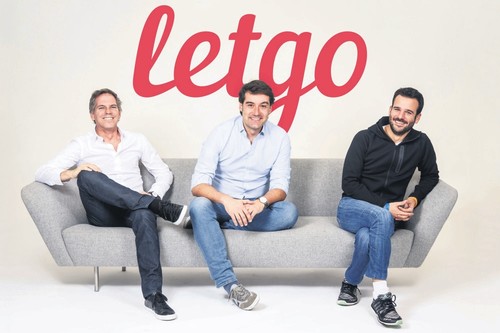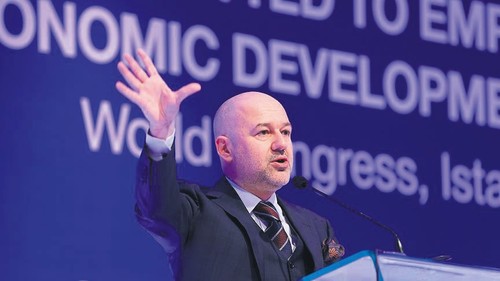© Turkuvaz Haberleşme ve Yayıncılık 2024
Cab drivers, bagel sellers and security guards have started to ask questions about bitcoin. What about peasants? They firstly register all products and every action that they do to blockchain. However, they approach the issue with a long-term perspective instead of a cunning point of view to make easy money. Of course, they name the terms of the digital economy with their own words. They use "crop value chain" for blockchain and say "crypto money" for cryptocurrencies.
Cryptocurrency started to be used in the sales of products in agriculture and stock raising in fictitious Bittikoyun translated as no sheep) village in Kayseri province, which has 110 houses, with a decision of the headman and council. Tourists coming to the village can shop with "BereketCoin" (AbundanceCoin) which is a digital currency, in the coffee house at the square and in the bazaar at the entrance of the village.
A fervent discussion is made in the coffee house at the village square. Indicating they have difficulties with credit cards, the village people say that they decide to transfer their money to a cryptocurrency with the advice of their grandchildren, nephews and nieces. This transformation, which starts in Bittikoyun village, spreads to six surrounding villages and İncesu county town. Then, they started to shop with "BereketCoin," which is their common cryptocurrency.
The idea comes from the grandchildren
Everything happens when the village people, who are indebted to the banks for years, discover blockchain and cryptocurrency thanks to their third generation grandchildren. They tell their problems to their grandchildren: "We don't want to be in need of banks. We are looking for a new solution with which we can transfer money easily, quickly and freely. We need a solution that we can use as a barter to sell our products to people that we want. However, the changes in the dollar and stock market shouldn't affect us. We don't want to be lost in educational costs and increasing fuel prices while being engaged with organic agriculture."
They say, "Our grandchildren firstly told us the value chain called the blockchain. We defined the transformation of everything from seeds to animals to this value chain in time. We started to get the need of energy from different sources. For example, we used solar power. Then, we determined a cryptocurrency among us. Our grandchildren named it BereketCoin [meaning abundance]."
BereketCoin takes over the village
The village people decide to transfer all products and the village ecosystem to blockchain before a digital money that they call "BereketCoin." That is, every product is involved in the chain at the moment when they are sown. No seed is missed. Every action in the pastures of the animals is also added to the chain along with the agricultural products. Every product that is produced in the village has a place in the common value chain. You can describe it as a seed, milk, fruit or honey with a time label. Therefore, there is no problem left about who produces what. The money of this chain, where every effort is measured, means abundance.
Bittikoyun: Assuming a fictitious village in Turkey
This fictitious currency, which is the dream product of the village, aims to shorten the distance between the producer and consumer, using less mediation and accounting. Is bitcoin a dream? Banks and institutions advocating the slow structure of the present system try to create gold from the pulp of the cryptocurrency, ignoring its basic benefits. Cryptocurrency, which is used as a part of the current system, will become the digital reason for this transformed system.
Disaster scenarios written on cryptocurrencies
Investment banks compete to finish the good scenarios about cryptocurrencies. Even if the ones who manage money within a traditional setting look like they aren't against, they try to prevent money from getting out of their control. Bad experiences of ordinary people and consumers with bitcoin and cryptocurrencies serve the purpose of those managing money today. Thus, consumers would be shocked that they couldn't get close to them for the next 10 years at least.
Boom in second-hand products in Turkey
Application platform Letgo, which has been trading second-hand products in Turkey for two years, attracted the most attention in Turkey after the U.S. The platform, where more than 22 million active products are for sale, became the marketplace where the highest numbers of second-hand automobiles are on sale.
Shopping for second-hand products through mobile devices accelerated in Turkey after 4.5G, the fast internet substructure. Having started to serve as the second-hand shopping application in Turkey since the beginning of 2016, Letgo was also the biggest marketplace of the second-hand automobile category in Turkey. It announced that the users of the application exceeded 75 million. Initiative reported users listed more than 200 million times around the world in the application and sent 9 million messages in a day and 3 billion in total, using its chat feature, as well.
Rapid growth in Turkey's Second-hand market

From left to right the founders of Letgo Alec Oxenford, Enrique Linares and Jordi Castello.
Expressing that rapid growth was also a big surprise for them, Letgo co-founder Alec Oxenford made a statement at the center of the initiative in New York and said, "We start to work with advertising through Google AdWords in every country, and in Turkey, we develop the application according to the comments and feedback of the users. We started advertisements on TV after a few months and decided to enter the market in Turkey since we see the huge potential in the second-hand economy there. Witnessing an unbelievable growth from that day to the present, we accelerated the growth in the market, as well. It was clear that Turkey was one of the biggest occasions in the world for a marketplace like Letgo. Consumers are so willing to shop easily in their districts there."
500,000 vehicles on showcase of Letgo
Letgo became the biggest local shopping application in a period less than two years thanks to its ease of use. According to the App Annie report, which was announced recently, it was shown that Letgo had been among the first five most-downloaded applications in Turkey. According to the numbers of Startups.Watch, it is the seventh most-downloaded application on the Apple iOS platform in 2017. With more than half a billion vehicles actively for sale, Letgo has become the biggest market for second-hand automobiles in Turkey.
22 million products on sale online
Selling more than 22 million active products from electronic items to furniture have been put up for sale on Letgo to date, Turkey Marketing Director of the initiative Onur Kavak said their talent of easy and quick product adding is based on the artificial intelligence algorithm. Implying they try to simplify the works of their users, following their demands closely, Kavak stated that the sellers list over 5 million products a month. "This number has increased 700 percent from the beginning of 2016 to the present," said the director.
Second-hand shopping protects environment
The free application enables users to sell the products that they no longer use or to buy second-hand items. Taking photos of a product is enough to put it on sale on Letgo. Thanks to its artificial intelligence and picture recognition feature, Letgo is one of the first applications that can categorize products according to their titles. After it was founded by Alec Oxenford and Jordi Castello, Enrique Linares joined them immediately after. Argentinian Alec Oxenford is a popular entrepreneur in South America. Supporting more than 70 initiatives as an angel investor, Oxenford drew attention that Letgo contributes to the environment. He said, "Producing a product anew means consuming of an important source. Second-hand products prolong the lives of many devices and also provide savings."
75 pct tax reduction for angel investors

Baybars Altuntaş
Hundreds of angel investors from 75 different countries came together in Istanbul as part of the world congress of World Business Angels Investment Forum (WBAF). Speaking at the opening ceremony, WBAF President Baybars Altuntaş announced that Istanbul will host the Global Entrepreneurship Congress in April, implying the city has the highest number of the diplomatic missions after New York.
Noting Turkey is a country which provides the biggest advantage to angel investors with income tax immunity at the rate of 75 percent, Altıntaş added that the supporting of small and medium enterprises (SMEs), which employ a great part of the economy and carries great importance. He also mentioned the support provided by the public to entrepreneurs can be used more efficiently, being transformed into smart finance by angel investors, and this will contribute to the economy of the state much more.
CEOs meet
In the forum, where more than 100 speakers from 60 countries will take place, politicians, nongovernmental organization leaders, bankers, stock market presidents, chief executive officers (CEOs) of Technoparks, international academics and important angel investors in the world are among the participants.
How the institutional investment capital and the angel investors will be met more from the beginning of the enterprise stage will be discussed in the forum, where global angel investment policies will be formed. Turk Telekom CEO Paul Doany, who met with CEOs on the second day of the forum, transformed the experience that he had as an angel investor to the users. Doany provided information on the working principles of the Corporate Venture Capital Company, which they established, as Türk Telekom, in order to support entrepreneurs. He underlined that they provide support for the opening up of entrepreneurs to the world.
Four educational programs
On the second day of the forum, four different training programs were organized by the World Angels Investment Forum Academy for entrepreneurs, angel investors, angel investment network managers and mentors. In the training provided by Chairman of the Swiss Angel Investment Trade Organization and European Business Angels Network (EBAN) Board Member Peter E. Braun, African Angel Investment Trade Organization President Harry Tomi Davies, U.K. Angel Investors Association Advisory Board Member and AngelNews Founding President Modwenna Rees-Mogg, Innovation Farm Co-Presidents Adriane Thrash and Argyrios Spyridis, how to be a good angel investor, how the professional management of a good angel investment network can be achieved, how to mentor startups, or how to get quality financing from investors as entrepreneurs will be taught in different training groups.
On the other hand, 10 separate startups and 10 scale-ups sought investment to expand their business, confronting international investors in the forum.
